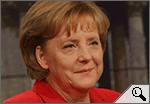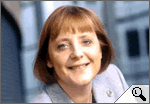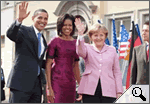|
|
|
|
 |
 |
 > Lacking in charisma, but very popular > Scientific education > The world's most powerful woman dimarts, 22 de setembre de 2009
On Sunday 27 September, Germany holds elections that will determine the composition of the Bundestag (the name given to the German parliament) and decide who will be chancellor, or prime minister. Angela Merkel, who in 2005 became the country's first female chancellor, hopes once again to lead the Christian Democratic Union (CDU) to victory.
And it looks like she will succeed. Opinion polls give the Christian Democrats 36% of the votes, 11 points ahead of their key rival, the Social Democratic Party of Germany (SPD). Behind them is the Free Democratic Party (FDP), with a predicted 13% of the votes, the Left Party, with 11%, and the Greens, with 10%. One thing is certain: there will not be an absolute majority, meaning that a coalition government will need to be formed. For the last four years, Germany has been ruled by a coalition between the two main parties: the Christian Democratic Union and the Social Democratic Party of Germany. It is possible that there will be a repeat of this coalition; however, a pact between the Christian Democrats and the liberal-leaning Free Democratic Party is not being ruled out. Either way, nothing has been decided, especially if we bear in mind that 40% of voters have yet to make up their minds.
Lacking in charisma, but very popularIt has been said that Angela Merkel is a politician without charisma or the slightest interest in her image (although she has tried to correct this perception by sporting a new hairstyle and wearing brightly coloured jackets). The fact is, however, that she has become Germany's most popular politician, on account of her rigour, her seriousness, her ability to engage in dialogue and for the way she has handled the economic crisis, from which Germany has already started to recover.
Scientific educationThe daughter of a Protestant pastor, Angela Merkel was born in Hamburg in 1954. When she was very young she and her family moved to what was then the German Democratic Republic. (At the time, Germany was divided between the capitalist Federal Republic of Germany and the communist German Democratic Republic.) There she studied physics and worked in the field of science. She entered politics at the time of the fall of the Berlin Wall (1989), which put an end to the division in Germany that was created in the aftermath of the Second World War (1939-1945).
The world's most powerful womanAngela Merkel headed the list of the hundred most powerful women in the world published by the US magazine Forbes in August this year. In second place was Sheila Bair, chairwoman of the Federal Deposit Insurance Corporation in the Unites States, for her role in tackling the economic crisis, followed by Indra Nooyi, chief executive officer of PepsiCo. Merkel also headed the three preceding lists: 2006, 2007 and 2008.
|
Investiga

> Debat televisiu entre Angela Merkel i el seu màxim rival, Frank-Walter Steinmeier.

> Cop d'ull als partits polítics que concorren a les eleccions alemanyes.

> Alemanya: de la divisió a la reunificació.

> Alemanys cèlebres, d'ara i del passat.
I també...
- Perfil d'Angela Merkel.
- La dona més influent del món.
- Merkel, segons la revista Time.
- Sondatges electorals.
Portada |
Europa Press |
El Punt |
La premsa |
Especials |
Diari de l'escola |
LesFinances.info |
Editorials |
Mail obert |
Els blocs |
Lletres
Tecnologia i ciència | Solidaritat | Cap de 7mana | Campus | El 9 | Presència | Fòrums | Enquestes | Xat | Correu
Traductor | Edicions en Pdf | Wap-pda | Biblioteca | Lletra més grossa
Tecnologia i ciència | Solidaritat | Cap de 7mana | Campus | El 9 | Presència | Fòrums | Enquestes | Xat | Correu
Traductor | Edicions en Pdf | Wap-pda | Biblioteca | Lletra més grossa
| Què és VilaWeb? Publicitat Mapa web Contacte | Una web de Partal, Maresma i Associats, S.L. |




